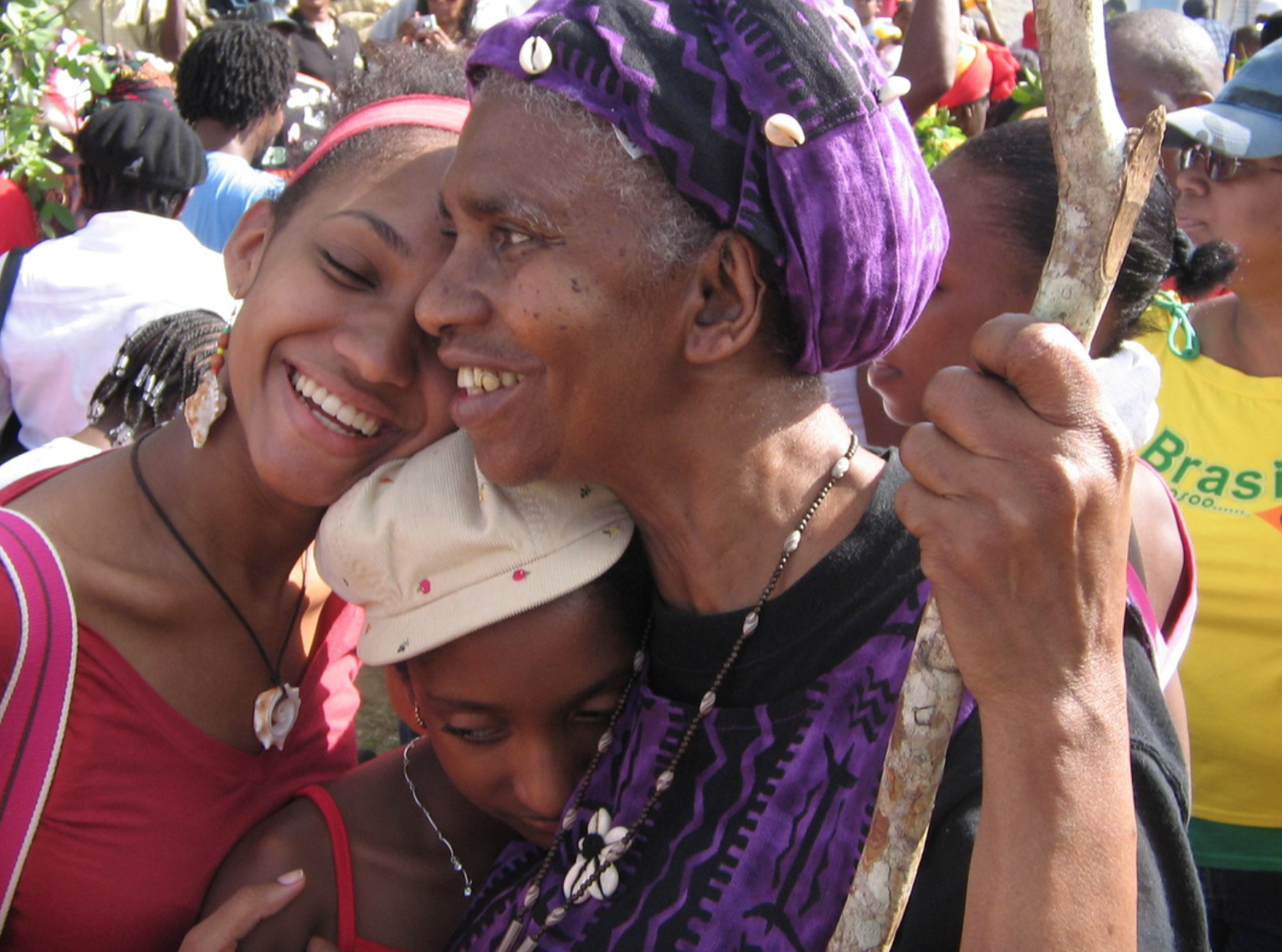“We are one, bound by the spirit of an island and Bilali the slave. Bound by high tide, fields, gossip, smoke mullet and our faith.”
Cornelia Bailey (kor-nee-lee-yah bay-lee), story-keeper, historian
“We try to teach our children the culture and remind them that they can be great. We stick to our heritage and we intend to carry on as free Maroons as long as the world exists.”
Sidney Peddie (sid-nee ped-dee), Colonel Accompong Maroons
“Cudjoe (18th century maroon freedom fighter) was taught and observed that the land the maroons occupied belonged to all of them and its amicable distribution and use must be perpetuated.”
Milton MacFarlane (milll-tun mick-far-lane), author
“Indigenous women in Jamaica live a role model lifestyle to redirect African people to a real image of compassionate family life, a unit that was totally intentionally destroyed in slavery.”
Gaama Gloria Simms (gah-mah glaw-ree-yah seems), Paramount Queen of the Maroons
“How can we preserve our culture and maintain our future? That's the first question we all need to ask ourselves.”
Marcia Douglas (mar-shah dug-lass), Colonel, Charles Town Maroons
“If you chop that branch, it’s filled with water that the Maroons would drink…This is why, when we cut a tree, we plant another one to replace it.”
Lloyd Wilks (loyd wilks), Jamaica's consul general at Toronto
“We make drums the same way our ancestors did 200-300 years ago. We play the same rhythms, the same songs that record the history of our ancestors.”
Wallace Sterling (wahl-lass stir-ling), Colonel Maroon Council
“Fight in the morning, fight in the day and fight in the night. There ain’t no giving in. In true maroon determination, doggedness and defiance, we will win.”
Nichole McIntosh (neh-kole mak-in-tosh), nurse, poet, blogger
“Africans who refused to be enslaved said, "Oh no. We insist to have the right to practice our African centered way of life as we see fit and we do not need a slave master over us.”
Nana Farika Berhane (fah-rick-ah beh-hahn), author and poet
“There is a lot of love inside the Vodou. It is our heart and blood. So we will not back down. We have an important and strong force with us. Without it, we could not exist today.”
Ougan Ricardo Marie Dadoune (ree-car-doh mah-ree dah-doon), priest
“I see my role as a human rights activist and as a Manbo Asogwe (high priestess) as one…to help to literally conjure memory, so that our sense of self and sense of place is restored.”
Manbo Asogwe Dòwòti Désir (doo-what-tee day-seer), high priestess
“We retained the language and the religion (of Africa) so both could serve us. I would say like two scissor tips cutting the skin, they could cut the chains of slavery.”
Ati Max Beauvoir (ah-tee max bow-vwahr), Supreme chief
“I worship my ancestors. They were free people in Africa, minding their business. Invaders came and took everything from them. The only thing they brought with them was vodou.”
Manbo Beatrice Daleus (bee-ah-triss deh-looz), priestess
“Vodou practitioners have the responsibility to look after the well-being of the population. They have received the powers and the knowledge to put (well-being) in practice.”
Ati Carl Henri Desmornes (kahl on-ree day-mahn), Supreme chief
“Do not forget Vodou is our culture and our religion at the same time. Don't forget we are descendants of Africans. We're born in Vodou.”
Ongan Michelet Alisma (meesh-lay al-smah), priest
“Gede (ancestral spirits) and all the others are always present anytime they are called upon. We feel as if they are with us always and they hear us whenever we call on them.”
Manbo Amelia Ingrid Llera (ah-mee-lee-yah een-grid yeh-rah), priestess
“Vodou comes from the enslaved people of Africa… They walked all over the world and came here to our land. This is the way we came to have the vodou spirit within us.”
Manbo Katy (mahn-bow kay-tee), healer & priestess
“We do not want to live in the past. The past that lives in us will transform this country for the better.”
Denildo “Biko” Rodrigues (day-neel-doh bee-koh rod-ree-guess), coordinator, national Quilombo Association (Conaq)
“Today we work rescuing our memory…It is all connected to our history - to return to the past, to seek our origins, to learn good things, to bring to the present and build a better future.”
Adilson Almeida (ah-deel-sun ah-may-dee-yah), Quilombo do Camorim Cultural Association
“That’s what we do here in this small corner hidden within the Amazon. Surviving so that we can obtain land titles and guarantee a piece of land for us to live on, for the future of our children.”
Claudinete Colé (claw-dee-neh-tee koh-lay), Boa Vista community leader




















